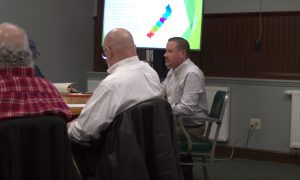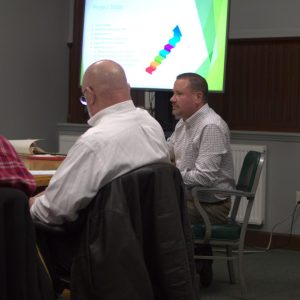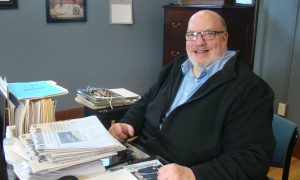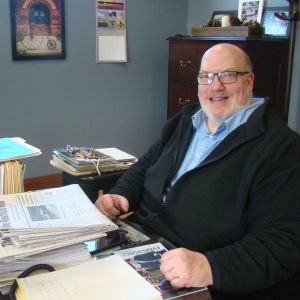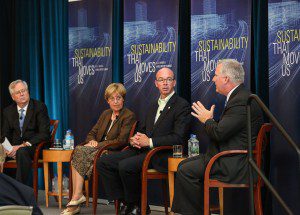
Mayor Daniel M. Knapik speaks on sustainability and economic development at yesterday’s US News & World Report Summit in Boston. (Photo by Bill Brett)
BOSTON – Mayor Daniel M. Knapik touted the many merits of Westfield during a summit on “Sustainability That Moves Us” in Boston yesterday.
Presented by the U.S. News and World Report and Siemens, the summit included questions from moderator Brian Kelly, editor at U.S. News, as well as from members of the invite-only audience. The first conversation of the event was with Boston Mayor Thomas M. Menino, who was asked about the Big Dig and Greenway and its role in Boston’s sustainability.
“I became mayor when the Big Dig started in 1993,” said Menino, adding that despite all the scrutiny, “it helped the economy and it was worth the disruption.”
Menino said while many people believe the word “earmark” has negative connotations, having a financial earmark for the Big Dig and resulting Greenway helped the city.
“This earmark was a Godsend to Boston,” he said.
In talking about the need to continue to fund the Greenway, now a popular riverside spot for families to picnic and stroll, Menino said that western Massachusetts doesn’t want to fund it, because they “don’t get it.”
Following his appearance, Menino was asked by The Westfield News what he meant by that.
“We are the economic engine for Massachusetts,” Menino said of Boston. “People come to Boston and the taxes we collect go everywhere. There is no eastern Mass. or western Mass., just one state.”
State Rep. Donald Humason said residents of western Massachusetts have balked at the cost of the Big Dig for a reason.
“I would say they don’t benefit, and that’s the problem,” said Humason, “However, I have friends who talk about how they went to Logan Airport and it took just minutes.”
State Sen. Michael R. Knapik (R-Westfield) said western Massachusetts understands the need to help fund projects such as the Big Dig, however, it also demands transparency and accountability for its tax money.
“We are called upon to support the capital city frequently for a variety of reasons,” Knapik said. “When it comes to the Big Dig – the biggest project in the history of Massachusetts – it was it was riddled with abuse that truly hurt the strength of every other city and town because so much money was spent for so long.”
Knapik said he believes Westfield’s Great River Bridge project became such a grand project because, in some way, the commonwealth was trying to make up for the Big Dig. He added that the Greenway also became an expensive project using public money.
“The Greenway was supposed to be privately funded, end of story,” Knapik said. “Then stories came out about people making six figures to make a green space smaller than the parks of Westfield.”
Knapik did say Menino is “a good mayor for Boston” and lauded him for helping turn Boston into a national city where jobs are created, which keeps the unemployment rate low across the state.
“Western Mass. is far better off to have a capital city called Boston and I’d rather be associated with Boston than Hartford or Albany,” Knapik said.
Knapik said cities and towns rely on Chapter 70 education funds and lottery funds from the state, and said there was once another state funding item called “additional assistance” that had a $400 million budget. Knapik said every year, Boston received half of that money and when people began probing into the account, it was discovered there was no rhyme or reason for how the money was divided up.
Because of things like the additional assistance and Big Dig, Knapik said western Massachusetts will pay its share, but it will be paying attention.
“I do think it’s always all about Boston. They need to understand we’re watching and if we don’t like something, we will call them out on it.”
Mayor Knapik participated in a panel discussion on “Sustainability and Economic Development: Lead Where We Must, Innovate Where We Should” with James W. Hunt III, chief of environmental and energy services for the City of Boston and Halina Brown, professor of environmental science and policy at Clark University.
To start the discussion Kelly asked the panelists what item is on their wish list.
“We need jobs,” said Knapik. “I say this to everyone I meet. We are a city of 43,000 and 2,000 are without jobs.”
Knapik said he represents Westfield and western Massachusetts.
“I’m for western Mass. – I don’t care about the MBTA. It sucks the lifeblood from us,” Knapik said, which brought laughs from the crowd.
Knapik talked about Westfield’s state-funded projects and said there is more revitalization forthcoming.
“We’re on the track to spending $100 million over the next few years,” he said, adding that he has always said the city needs to take care of its property before expecting residents and businesses to do the same.
He credited the good relationship Westfield has had with the state over the years for the open dialogue that helped the city receive approval for projects.
Brown’s wish list included building zero energy buildings and creating more opportunities for young professionals to become entrepreneurs, something Knapik knows something about.
“One of the greatest days of my life was when I incorporated my business,” said Knapik. “The City of Westfield has a great entrepreneurial spirit.”
Knapik cited the Westfield Gas and Electric, city water and sewer works, the transfer station and landfill as assets.
Knapik spoke about technology and how it has changed the job market and told Brown he is in agreement with green building.
A morning panel discussed sustainability in terms of transportation and Knapik said in western Mass., transportation is an issue.
“Regional transit is doing a lousy job of connecting our folks to work,” he said, noting that the planned transportation center would help alleviate that problem.
Knapik invited the audience, which was comprised mainly of Siemens employees and representatives of larger companies in the Boston area, to visit Westfield.
One audience member stood to ask a question of the panel and stated that he would like to take Knapik up on the offer to visit. Several other people in the audience also said they liked what they heard about Westfield.
Menino called Westfield “a great little city.”
The summit concluded with keynote speakers Greg Bialecki, secretary of the executive office of housing and development for the commonwealth, and Nancy Sutley, chairperson of the council on environmental quality for the White House.
To watch video of Mayor Menino’s portion of the program, click here.

